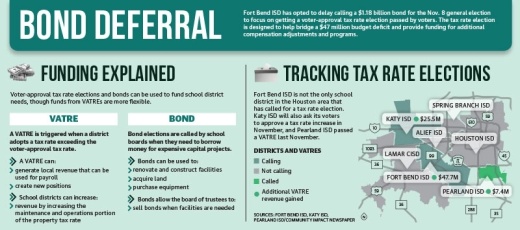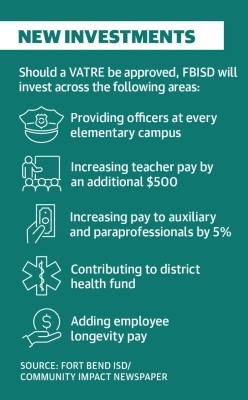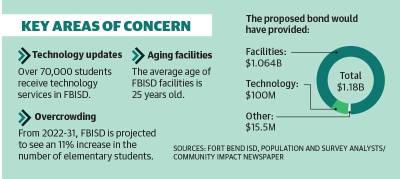During FBISD’s Aug. 15 meeting, district officials announced their intent to delay the $1.18 billion bond until May 2023, and the board of trustees formally approved the VATRE when it called the tax rate election during its Aug. 22 meeting.
“We don’t want to do anything that would take away the focus from the No. 1 priority of a VATRE,” FBISD Deputy Superintendent Steve Bassett said. “While there are some risks to postponing the bond, we do think that we can address those risks.”
The tax rate election has been given greater priority as FBISD looks to bridge a $47 million budget deficit in fiscal year 2022-23, which will begin Oct. 1, and provide the district room to pay for additional compensation adjustments, programs and safety measures, including providing officers at every elementary school campus, district officials said.
“Just given the economic climate and everything, I agree with the assessment from both the Bond Oversight Committee and the leadership team that the VATRE is the priority,” Trustee David Hamilton said.
However, delaying the bond until May 2023 marks the second time several bond projects have been pushed back, including new schools, safety and security upgrades, school rebuilds and technology updates.
As FBISD focuses on a tax rate election to address its budget deficit, the district will need to grapple with how to address its growing needs, especially regarding school overcrowding and aging facilities.
Addressing needs
Despite the district’s needs that a November bond would begin to address, a tax rate election is an avenue that must be pursued if FBISD is to remain on top of its budget and prevent a future bankruptcy, officials said.
“At the end of this school year, if no VATRE, we will have used all of our [Elementary and Secondary School Emergency Relief] funding, and we would then fall below our 90-day operating fund balance,” FBISD Finance Director Bryan Guinn said.
When the FBISD board of trustees unanimously approved the district’s $768 million budget for FY 2022-23 on June 20, that approval included a $47 million budget shortfall that was offset using the district’s existing reserve and $27 million in one-time federal ESSER funds. Of that deficit, $26 million is attributed to an enrollment shortage.
Enrollment projections from demographic firm Population and Survey Analysts show in 2021-2022, FBISD was below projections by about 2,853 students. Still, FBISD earmarked facility bond projects around projections that enrollment growth would continue unabated over the next several years with some areas facing overcrowding, Bassett said.
The Ridge Point feeder pattern, which includes Schiff, Sienna Crossing and Heritage Rose elementary schools, faces overcrowding, according to a February PASA report. Sienna Crossing and Heritage Rose with capacities of 1,010 and 1,134, respectively, are projected to have 1,220 and 4,450 students living in their boundaries by 2031.
"With the Heritage Rose overcrowding, if we add up all of the students projected to live in that area, ... [they] will exceed the capacity by 3,300 students in 10 years,” PASA President Stacey Tepera said at a Feb. 14 board meeting.
The need for more space in these areas was highlighted in the bond initially set for 2022. It joins facility needs earmarked in aging schools such as Clements High School along with Mission Bend and Briargate elementary schools. The youngest—Clements—is nearing 40 years old, per the district’s website.
However, though overcrowding and aging facilities remain important to FBISD, district officials said focusing on a tax rate election will have short- and long-term financial effects as it looks to the future.
Financial implications
If approved, the VATRE proposition coming before FBISD voters Nov. 8 would result in a $0.0755 tax rate increase. It is the first time the district has asked for voter approval of a tax rate increase, Bassett said.
The new tax rate would maintain the current rate of $1.2101 per $100 of assessed property value, if approved. A VATRE is required because the district would have otherwise only been allowed to approve up to a tax rate of $1.1546, per the Texas Tax Code.
However, because average taxable property values have increased since last year, residents will still pay higher taxes, Guinn said. Should a VATRE be approved, the average resident would see a $208 increase on their annual property tax bill, according to district documents.
However, Texas’ public school funding model does not allow districts to recoup the full benefit of rising property values, FBISD Superintendent Christie Whitbeck said at the Aug. 15 meeting. That plays a part in why a VATRE is necessary, district officials said.
“This is a myth that people think the school district gets that money,” Whitbeck said. “If we get more [property tax] money, then the state gives us less, so it’s equaled out.”
The district would earn an additional $47.7 million in revenue in its general fund with the VATRE. That would be used to bridge the district’s FY 2022-23 budget shortfall and allow FBISD to save ESSER funds to pay for other investments, including hiring more police officers and increasing teacher pay.
However, district officials said even with more revenue, the district will still need to cut $23 million a year starting in the 2023-24 school year.
“We do have work that we would still continue to do to reduce our expenditures ... to maintain a budget that maintains the 90-day operating reserve as required by board policy,” Guinn said.
Though still in the works, to achieve these cuts, FBISD is considering reducing 353 positions over the next several years, abandoning some programs and consolidating schools. The reduced positions would come from not rehiring people to fill turned over positions.
As FBISD continues to find ways to cut spending to maintain its budget, the district is also considering methods to address priority facility needs in the interim before the May 2023 bond election, district officials said.
‘Evolving discussions’
The decision to push the bond to May 2023 came after district officials realized the bond oversight committee was unable to decide on the November bond effort, Guinn said.
Also, having a VATRE in the same election as a bond—which would be split into three propositions—could confuse voters and jeopardize the success of both, Bassett said.
Key to the $1.18 billion postponed bond package included $1.064 billion in major facility projects, including renovations and rebuilds, new schools, safety and security, and technology, per district documents.
A $222.8 million Clements High School project was the most expensive project earmarked in the proposed bond, which would include demolishing the existing building, and rebuilding it with an updated design and more capacity. The postponed bond also listed rebuilds of Mission Bend and Briargate elementary schools—worth $47.2 million each.
Though the district’s focus is now on a tax rate election, the needs addressed in the bond will not go away, Chief Operations Officer Oscar Perez said.
“I’d like to have the bond yesterday, but I also understand that a VATRE is definitely needed,” he said during the Aug. 15 meeting. “I would hate to cloud the public’s opinion on what we truly need.”








